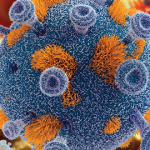HIV may increase the risk of certain rheumatic conditions in HIV patients through several mechanisms. Researchers have found the HIV p24 antigen and HIV DNA in the synovial fluid of specific joints affected in individuals with HIV-associated arthropathy.13 Related viruses are known to cause arthritis in animals and humans.4 HIV also causes dysregulation of the immune system that can facilitate autoimmunity.14 The virus causes not only immunodeficiency, but also sometimes other transient serum abnormalities, such as positive IgG rheumatoid factor and anti-CCP antibodies.15
Complexities in Diagnosis
Whether HIV itself is best thought of causing these conditions or simply increasing their likelihood, it can lead to challenges in diagnosis. For example, rheumatoid arthritis can appear quite similar to HIV-associated arthritis, but mistaking one for the other can lead to problems for patients.16
Adewale O. Adebajo, MBBS, MSc, is a professor of rheumatology and health service research at the University of Sheffield in Sheffield, England. He is also one of the authors of a recent review providing a practical guide for managing inflammatory arthritis in HIV-positive patients.

Dr. Adebajo
Dr. Adebajo explains, “One of the key issues is that patients who are HIV positive can develop arthritis from HIV that can mimic or disguise rheumatoid arthritis.” He argues for thoughtfulness in giving a diagnosis of rheumatoid arthritis to such HIV-positive patients. “There are various serological indications including ESR and rheumatoid factor and so on, but you need to be cautious in interpreting markers in these patients. I would advocate retesting in those patients at least six months down the line.”
Diagnosing these patients incorrectly can have implications for their treatment. “In general, in patients who have HIV-related arthritis, we would initially start with a non-steroidal anti-inflammatory drug and then see how they respond. But we stopped doing that with RA many years ago. Now, once we make a diagnosis of rheumatoid arthritis, we immediately put them on disease-modifying drug, usually methotrexate.”
Monitoring may also be more challenging in patients who have both rheumatoid arthritis and HIV. Dr. Adebajo recommends being aware that such factors as the sedimentation rate are often consistently elevated in patients with HIV, so rheumatologists must use other clinical measures to assess disease status. (Carroll and colleagues recently reviewed more specifics on the management of RA in patients with HIV.)16
HIV-Specific Rheumatic Syndromes

The human immunodeficiency virus in the blood stream.
Spectral-Design/shutterstock.com
For rheumatologists practicing in the U.S., it is worthwhile being aware of HIV-specific rheumatic syndromes, even though they seem to be occurring less frequently since the availability of cART treatments.


